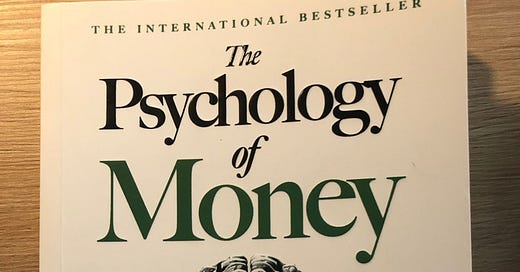
Discover more from Max Dividends
Stay Invested: Actionable Tips On How to Make Your Money Work for You
The importance of investing based on personal stories
Hi everyone! This is Max!
I’m excited to share something new with you today. I’m thrilled to introduce you to Denis Gorbunov and his blog Stay Invested.
Denis is focused on financial freedom and explains the importance of investing based on personal stories. Expect from Stay Invested to get actionable tips on how to make your money work for you.
Here is the important and most value story he would share with you. I highly recommend learn more about the way Denis is doing with his Stay Invested blog.
Let’s read his story!
“This Weird Book Taught Me to Be Financially Unbreakable”
The best lessons on building wealth by investing
I’ve read twenty-three books on investing. Twenty-two focus on capital markets. Only one focuses on the investor.
If you want to make your money work, you need to have yourself under control first. The Psychology of Money by Morgan Housel tells you how not to be your enemy in money management.
Here are my top three lessons from the book
1. “You need to plan on your plan not going according to plan.”
I had a plan in the stock market until my first crash in 2020.
The nasty event wiped out my paper gains and another 30% of my portfolio. I didn’t sell it in panic but it felt like a slap in the face.
My plan sucked because it was all about chasing gains, not keeping them. Investing in hot stocks works until things get messy. When everyone panics, either you’ve already sold your positions or need to sit still and wait out the bear market.
I chose the latter but not because I was a savvy investor. It simply was too late. So I made two rules to follow before buying a stock:
● Find every reason *not* to buy it.
● Ask myself what I’d do if things turned sour before I made profits.
It was like making a deal with myself while my emotions were running low. I set a price point to sell my position if things went south so I’d lose $500 tomorrow instead of $5,000 a week later.
This is more solid risk management because you have an action plan. The Psychology of Money says that the world is governed by odds, not certainties.
There’s a better way to set the odds in your favor - to commit to a long-term investing strategy instead of buying and selling stocks. You add to your portfolio regularly regardless of market tantrums, economic sh*tstorms, and political circus.
This approach has worked for me. The moment my paycheck lands in my account, part of it goes to my portfolio. Repeating this every month is boring. But when you look back and see you’ve gone from four to six figures in a few years, you realize that your long-term commitment is the only thing that matters. Everything else is noise.
Focus on what you can control — your attitude.
2. “Don’t raise your paycheck, raise your humility.”
Ronald Read is the most humble person I know. He swept floors and saved 80% of his paycheck.
His investment portfolio shocked the world when he died in 2014: $8 million. Not bad for a janitor. Mr. Read donated $6 million to a local library and hospital and $2 million to his grandchildren.
He didn’t do anything special except he stayed invested for a really long time — six decades. ETFs weren’t available in his day so he bought individual stocks and held them long-term.
Mr. Read’s astronomical portfolio is a sign anyone can make money if they can stay humble and live below their means. Money was Mr. Read’s vehicle to wealth. It was his big goal. He wasn’t after short-term rewards.
I don’t know how he identified undervalued stocks. But one thing is certain — he didn’t let impulsive emotions affect his financial decisions.
Acquiring wealth is more psychology than math. 70% of the US GDP is driven by consumer spending. Businesses know that people buy on emotion and justify with intellect. You may splurge on a luxury watch you don’t really need instead of saving and investing the money.
The stock market is no different. Stock fundamentals are based on individual companies’ cash flows, revenues, and earnings. But stock valuations are based on emotions.
You can’t make $8 million as a janitor if you succumb to emotions. What helps is separating your needs from your wants. Focus on your needs and be critical of your wants. It’s your wants that can wipe you out financially.
Being wealthy is choosing to enjoy simple things while being able to afford a fancy lifestyle. Morgan Housel says that’s what keeps the most money in your pockets.
Spend less than you earn and be smart with the difference.
3. “Wealth is an option not yet taken to buy something later.”
Perhaps you’ll never take it but that’s not the point.
Investing is giving money to your future self. You’re financially secure if you can put aside part of your wage. But that’s focusing on the present moment.
You don’t know what your life will be like in a year, let alone in retirement. Buying something later means thinking ahead to a time when your physical health matters more than work.
The lesson on wealth in The Psychology of Money resonated with me because my father didn’t give this option to himself.
He used to do home renovations for wealthy clients. The business was thriving during the construction boom in the 2000s. Clients were standing in line to hire him. He’d have three objects at the same time in different parts of the city.
I remember meeting him once a week. The bags under his eyes revealed how exhausted he was. But he was cheerful because he was doing what he loved.
The money was good. He re-married and saved enough cash to buy a large modern apartment for his second family.
What could go wrong when he was at the peak of his success?
The 2008 Financial Crisis wiped out his clients who became desperate to sell those homes. My father tried to find new customers but they disappeared faster than Lehman Brothers.
That’s not all.
He never registered his business or paid taxes. He had no social security, no savings, and no state pension. He was suddenly more alone than Voyager 1 drifting in space. One thing led to another and he ended up getting divorced from his second wife (and moving out).
The Great Recession exposed my father’s weak point — lack of long-term financial planning. It wasn’t obvious when the economy was booming.
He finally came to terms with his situation and found a job watching over an old building. It keeps him occupied, which is good for his mental health. But you can still see regret in his eyes.
It’s hard to look ahead and plan for a recession when you’re prospering. We forget that bad times come after good times, and good times come after bad times.
You’ll eventually win the investing game if you give yourself a long time horizon that makes recessions look like small bumps in the road. But short-term, nasty things happen.
Stay hopeful about the future but stay sharp about the present.
The bottom line
Everyone interested in money management should read The Psychology of Money because it teaches us to deal with our emotions. I could relate to many lessons in the book. My top three are
● To plan for the unexpected
● To boost my humility to spend less
● To build my own retirement fund
Don’t let money control your life. Take charge of it instead.
Subscribe to Max Dividends
High Yield & Dividend Growth Stocks worth investing in to boost your passive income for living off dividends and retire early.











Denis, I'd also recommend "Antifragile: Things That Gain from Disorder" by Nassim Nicholas Taleb. I learned from this book to have a small amount of my portfolio in high risk-reward assets, such as options" while being conservative with the rest. If the stock market goes up, I should outperform. If it crashes, I have plenty of dry powder.
Literally read the book in a couple days. And I’m picky about the books I read.